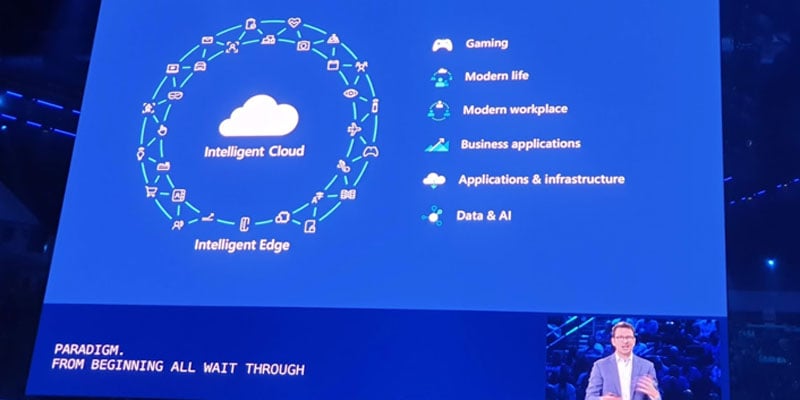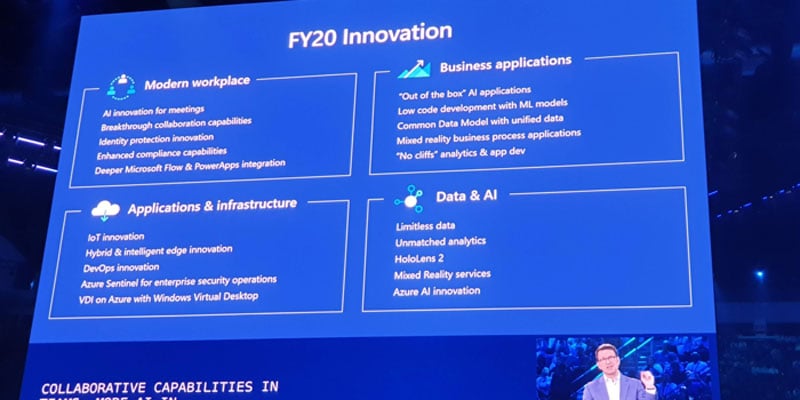Microsoft Inspire 2019 is just behind us. Microsoft took four days in Las Vegas to inform and inspire more than 15,000 partners from around the world (the trade show is not called Inspire for nothing) about the strategic direction it is taking. A mountain of information about strategy, products, services and innovation. Team Arxus was present and picked out four major topics that are particularly relevant to the business cloud. Business first cloud solutions, you know?
Two years ago already, Microsoft presented its concept of "Intelligent Cloud & Intelligent Edge". That still revolves around the ubiquity of intelligent devices (Internet of Things) and the cloud, powered by artificial intelligence. Microsoft itself describes it as "the capabilities of cloud computing spread to near the edge of the cloud, where they seamlessly blend and are used by all the devices in our lives."
Does that sound too vague? It simply goes to show that Microsoft wants users to no longer know they are using cloud services and have the information they need on any device at any time. On the business front, Microsoft is making great efforts in that area with Office 365, for example. Another nice example is that every Starbucks coffee machine is now equipped with an Azure Sphere IOT Edge Chip. In this way Starbucks collects data from each machine and can intervene even before a problem would (should) lead to a repair.
At Inspire 2019, Microsoft showed that it has nicely divided that Intelligent Cloud into six pieces: Gaming, Modern Life, Modern Workplace, Business Applications, Applications & Infrastructure and Data & AI. The first two are clearly in the home sphere, the last four focus on the business cloud. And are therefore the most relevant to us.

And for those four pieces, Microsoft does have some innovations planned for 2020. Innovations that, not coincidentally, we had already bet on in our strategic plans for the coming years.

Security was one of the most important topics throughout the programming of Inspire 2019. So with Microsoft Azure Sentinel, Microsoft had something to talk about.
Azure Sentinel is a Security Information and Event Management (SIEM) platform in the cloud that uses advanced AI and security analytics. Specifically, Azure Sentinel helps you detect and stop threats even before they can do damage.
Azure Sentinel does a number of things. The platform:
Of course, the main advantage of Azure Sentinel is that it is cloud-native. So you can automatically scale the platform to your organization's needs and requirements, and you only pay for the resources you use.
In case it was not yet clear after the much-discussed purchase of GitHub: Microsoft is betting on developers. The legendary "Developers, developers, developers!" keynote by Steve Ballmer can be taken out of the dust again. The approach is, of course, completely different.
Microsoft's philosophy is clear: it wants to make the Azure platform as open as possible. Whether your application runs on Linux or Windows, uses database model X or Y ... it must have a place on Azure. This is not illogical when you know that experts predict that over 500 million new applications will be developed for the cloud or migrated to the cloud in the coming years.
In addition to the purchase of GitHub, this renewed focus is also reflected in a whole host of new features in Visual Studio and Azure DevOps. But what attracted the most attention was Azure Playfab, a complete backend platform for live games. It gives live game developers a platform that handles complex things like real-time score processing, logging into multiplayer platforms, etc. all out-of-the-box. We were very impressed and have already set up a first case with Hoverloop, a multiplayer arcade arena combat game being developed by Not a Company, a game developer from the Cronos Group.
Within the theme "Modern Workplace" there was actually only one real topic: Microsoft Teams. The collaboration tool is experiencing strong growth and in 2020 Microsoft wants to see the use of Microsoft Teams increase even more explosively. No expense was spared to spotlight the possibilities and advantages of the collaboration tool.
Even Microsoft CEO Satya Nadella had something to say about it in his keynote:
Microsoft already wants to convince massive "Skype for business" users to migrate to Teams in 2020 and thus compete head-on with Slack. The main arguments: that just about all Microsoft products (will) seamlessly integrate with Teams. Obviously the other components of Office 365, but also SharePoint, PowerBI, etc.“The one product that has had an absolute breakout year is Teams. Teams is the hub for teamwork. It’s really four things in one, right? It has chat, it has meetings, it brings together collaboration using all the richness of Office tools within that same scaffolding. It’s the business process workflow. That’s what Teams is about. It defies, even the category definitions that are there out in the marketplace. And that’s what’s driving this tremendous momentum.”
- Satya Nadella, Microsoft CEO
Have you soaked up all the exciting updates and announcements from this year’s Microsoft Ignite? Because we certainly have: from brand-new features for Copilot, Windows 365 and Microsoft Fabric, to exciting improvements for Microsoft Intune, Azure Virtual Desktop and much more. Let’s dive straight
Is your IT infrastructure made up of different cloud platforms? Or do you still have some on-prem servers running? Then Azure Arc is the perfect tool for you! It allows you to manage your entire hybrid or multi-cloud environment in the blink of an eye, from one central location. Want to find out
Microsoft has announced that as of Sept. 30, 2025, they will no longer support default outbound connectivity for virtual machines (VMs) and scale sets. And that obviously has significant implications for users who currently (still) rely on it. Wondering why Microsoft made this decision? And what